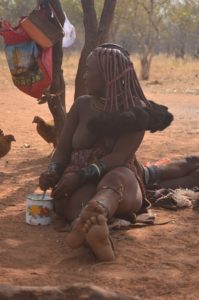Who you are is defined by many things. We are taught at a young age to view ourselves as individuals, and to understand the aspects of our culture. Some believe that culture, family, experiences, and life achievements are just a few drops in the ocean that make up who we are.
Marcus Garvey once said, “a people without knowledge of its past is like a tree without roots.” There was one moment during this study abroad when Marcus Garvey’s quote had deep significance for me in my self discovery. We visited a small Himba village during our tour of Namibia, and when we arrived the first thing we noticed were the clothing of the Himba women. They wore only small skirts made of cloth around their waist. Their bodies from head to toe were covered with a red clay like substance. They were beautiful, and strong women in my opinion, and you could see their curiosity about us equaled our own curiosity of them.
One of the Himba women asked me and two other PVAMU students, what tribe we came from. We looked at each other in unison, as we felt the same jolt of bewilderment as the question seeped into our minds. We answered the women politely, “We don’t have tribes in America, we are just African Americans.”
Just as surprised as we were by her question she was even more surprised by our answer. At this point the translator tried to help us understand their confusion. He said, “We understand that we are all black, but you must know what tribe you are from.” Once again, we stated that we do not know of our tribes, we never had them, and that’s just how it is in the U.S. The women told us, “Your history is very important. You must know your history in order to know yourself, you must know what tribe you came from; we all have a home.” Immediately, I thought of Marcus Garvey’s quote, and wondered just how far my roots have actually spread.
